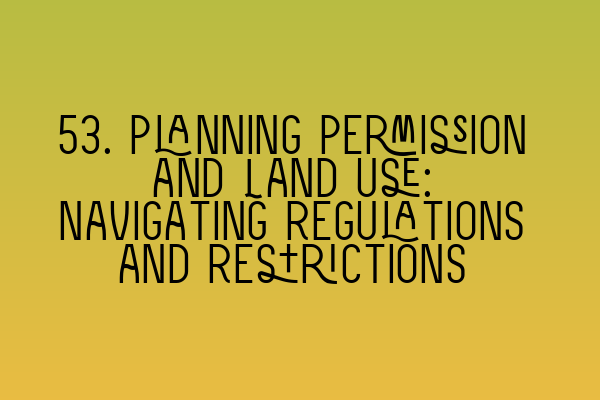Planning Permission and Land Use: Navigating Regulations and Restrictions
When it comes to property development and land use, obtaining planning permission is an essential step. Planning permission ensures that any proposed changes or developments comply with local regulations and restrictions. Navigating the planning permission process can be complex and time-consuming, but it is crucial to ensure compliance with the law and avoid potential legal issues in the future.
At SQE Property Law & Land Law, we understand the importance of planning permission in property development. We have helped numerous clients successfully navigate the planning permission process and achieve their desired outcomes. In this article, we will delve into the intricacies of planning permission and provide you with valuable insights on how to navigate regulations and restrictions.
Understanding Planning Permission
Planning permission is a formal approval granted by the local planning authority for proposed changes or developments to a property. It is required for various types of projects, including but not limited to:
- Building a new property
- Extending an existing property
- Changing the use of a property
- Carrying out external alterations
Before undertaking any development or change in land use, it is essential to determine whether planning permission is necessary. Failing to obtain planning permission when required can lead to enforcement action, fines, or even the demolition of non-compliant structures.
The Planning Permission Process
The planning permission process can be complex and involves several steps. Here is an overview of the typical process:
- Pre-application: Before submitting a formal planning application, it is advisable to undertake a pre-application process. This involves engaging with the local planning authority, discussing your proposal, and seeking their advice. Pre-application discussions can help you understand the council’s expectations, identify potential issues, and make necessary adjustments to your plans.
- Application submission: Once you have finalized your plans, you can submit a formal planning application to the local planning authority. Your application should include detailed drawings, supporting documents, and any relevant fees.
- Application review: The local planning authority will review your application, taking into account various factors such as land use policies, environmental impact, and the community’s interests. They may request additional information or consult with external bodies, such as the Environmental Agency or Historic England.
- Public consultation: In some cases, the planning authority may require public consultation, especially for major developments or controversial proposals. This allows the local community to provide feedback and voice any concerns they may have.
- Decision: After considering all relevant factors, the planning authority will make a decision on your application. They can either grant permission, grant permission with conditions, or refuse permission. If permission is granted, it may be subject to certain conditions that must be met before the development can proceed.
- Appeals: If your application is refused or granted with conditions that you disagree with, you have the right to appeal the decision. The appeal process involves presenting your case to the Planning Inspectorate, an independent body that reviews planning decisions.
Navigating Regulations and Restrictions
Navigating the regulations and restrictions related to planning permission can be challenging. However, there are several key considerations that can help streamline the process:
1. Research Local Planning Policies
Before submitting a planning application, it is crucial to research and understand the local planning policies and regulations. Familiarize yourself with the development plan for the area and any relevant supplementary planning documents. This will give you an insight into the council’s preferences, priorities, and any specific requirements that need to be met.
Related Article: SQE 1 Practice Exam Questions
2. Engage with the Local Planning Authority
Engaging with the local planning authority during the pre-application stage is highly recommended. Seek their advice, share your proposals, and proactively address any concerns they may have. Collaborative discussions can help you understand the council’s expectations, potentially reduce objections, and expedite the decision-making process.
3. Provide Comprehensive and Well-Structured Applications
When submitting a planning application, it is essential to provide comprehensive and well-structured documentation. Clear and detailed drawings, along with supporting documents, such as design and access statements and ecological reports, can strengthen your case and help the planning authority assess your proposals more efficiently.
Related Article: SQE 1 Practice Mocks FLK1 FLK2
4. Consider Community Interests
Local communities often have a say in the planning process, especially for major developments. Consider conducting public consultations or engaging with relevant stakeholders to understand and address community concerns. Demonstrating that you have taken community interests into account can increase the chances of a successful planning application.
5. Seek Professional Assistance
Given the complexity of planning permission regulations, seeking professional assistance can greatly benefit your application. Property law solicitors, with their expertise and knowledge of local regulations, can provide valuable guidance throughout the process. They can help ensure your application meets all necessary requirements, liaise with the planning authority on your behalf, and advise on any potential challenges or opportunities.
Related Articles: SQE 2 Preparation Courses and SQE 1 Preparation Courses
Conclusion
Navigating planning permission and land use regulations is crucial for successful property development. Understanding the planning permission process, conducting thorough research, engaging with the local planning authority, and seeking professional assistance can all contribute to a smooth and successful application process.
If you require expert assistance with planning permission or any other property law matters, contact SQE Property Law & Land Law today. Our team of experienced solicitors is dedicated to helping clients navigate the complexities of property law and achieve their desired outcomes.
Related Article: SRA SQE Exam Dates
